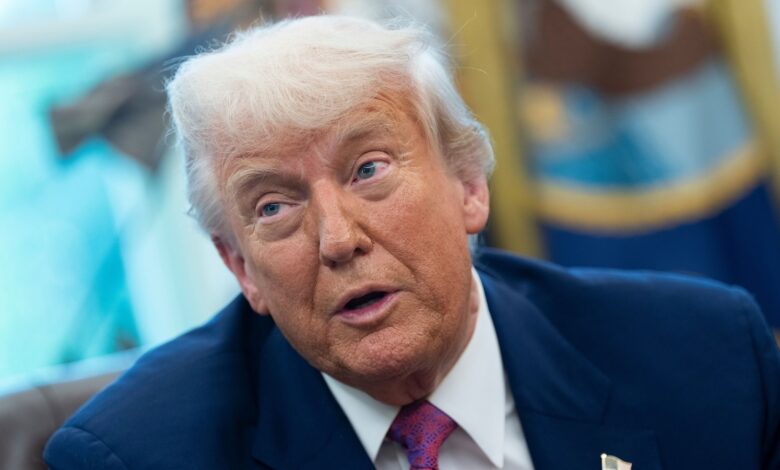Trump holds gala for top investors in his meme coin, as some critics slam event as pay-for-play

The exclusive black-tie dinner hosted by President Donald Trump for the top investors in his cryptocurrency meme coin has sparked controversy and criticism from many quarters. The event, which took place at Trump’s private golf club in Northern Virginia, saw 220 cryptocurrency traders, including prominent figures like Lamar Odom and Justin Sun, gather to hear the president speak about the future of crypto.
The gala, which was promoted as the “most EXCLUSIVE INVITATION in the world,” required participants to invest tens of millions of dollars in Trump’s meme coin to gain entry. Critics have accused the president of using the event as a pay-for-play scheme to benefit financially from his position of power. Protesters, including Sen. Jeff Merkley, were seen outside the venue bearing signs condemning what they saw as blatant corruption.
Trump’s meme coin, known as $TRUMP, experienced a surge in value following the announcement of the gala, with investors scrambling to secure a spot at the dinner. The top 25 investors were promised a special VIP tour and an exclusive reception with the president before the event.
Many attendees, like Cherry Hsu of MemeCore, saw the gala as an opportunity to engage with Trump on issues related to cryptocurrency regulation and decentralization. Hsu’s company finished second in the competition to attend the dinner, and she expressed eagerness to discuss these topics with the president.
Despite the allure of rubbing shoulders with the most powerful man in the world, the event has raised concerns about the ethical implications of such a gathering. The identities of most attendees remain undisclosed, with many using pseudonyms connected to their cryptocurrency wallets.
As the controversy surrounding the gala continues to unfold, it remains to be seen whether Trump’s foray into the world of cryptocurrency will have lasting repercussions on his presidency and legacy. According to analysis from the nonprofit research group Accountable.US, the majority of the top investors in the cryptocurrency $TRUMP are foreign-based. Among those investors are an Australian entrepreneur, a New York-based crypto enthusiast, and Justin Sun, a Chinese crypto mogul known for his controversial ties to the Trump family.
Sun, who has invested millions in $TRUMP and other Trump-backed crypto ventures, has faced scrutiny for his close relationship with the former president. Despite allegations of fraud, Sun’s legal troubles were halted by SEC lawyers under the Trump administration, raising questions about potential conflicts of interest.
The financial impact of $TRUMP on investors has been mixed, with some wallets making millions while others have incurred significant losses. Data from analytics firms suggest that Trump and his partners have profited from transaction fees, but the majority of investors have not seen significant returns on their investments.
President Trump’s embrace of cryptocurrency has been a recent development, with him declaring himself the “Crypto President” and implementing changes to U.S. regulatory policies on digital currencies. His administration’s promotion of cryptocurrencies has coincided with his family’s involvement in various crypto ventures, including the launch of the $TRUMP meme coin and partnerships with international investment firms.
Critics have raised concerns about potential conflicts of interest, with Democrats and some Republicans questioning the Trump family’s involvement in the crypto industry. The GENIUS Act, a proposed legislation to regulate certain cryptocurrencies, has faced opposition due to these concerns, further highlighting the complexities of Trump’s foray into the crypto world.
Despite denials of influence-peddling from the White House, the ongoing scrutiny of Trump’s crypto ventures underscores the challenges of navigating the intersection of politics and finance. As the debate over cryptocurrency regulation continues in Congress, the implications of Trump’s involvement in the industry remain a topic of contention among lawmakers and the public. The world of technology is constantly evolving, with new advancements being made every day. One of the most exciting developments in recent years is the rise of artificial intelligence (AI). AI is a branch of computer science that involves creating machines that can perform tasks that typically require human intelligence, such as speech recognition, decision-making, and visual perception.
AI has the potential to revolutionize many industries, including healthcare, finance, and transportation. In healthcare, AI can be used to analyze medical images, diagnose diseases, and even assist in surgeries. In finance, AI can help detect fraudulent activity, predict market trends, and automate trading. In transportation, AI can improve traffic flow, optimize routes, and even drive autonomous vehicles.
One of the key benefits of AI is its ability to process large amounts of data quickly and accurately. This can help businesses make more informed decisions, improve efficiency, and save time and money. For example, AI-powered chatbots can handle customer inquiries and provide support 24/7, freeing up human employees to focus on more complex tasks.
However, with the rise of AI comes some concerns as well. One of the biggest concerns is the potential for job displacement. As AI becomes more advanced, there is a risk that many jobs currently held by humans could be automated, leading to unemployment for a large portion of the workforce. Additionally, there are ethical concerns surrounding AI, such as bias in algorithms, invasion of privacy, and the potential for misuse by malicious actors.
Despite these concerns, the potential benefits of AI are vast. By harnessing the power of AI, businesses can become more efficient, productive, and competitive. It is important for policymakers, industry leaders, and technologists to work together to ensure that AI is developed and used responsibly, ethically, and for the benefit of society as a whole.
In conclusion, AI is a powerful technology that has the potential to transform the way we live and work. By leveraging the capabilities of AI, businesses can gain a competitive edge, improve efficiency, and drive innovation. However, it is important to address the potential risks and concerns associated with AI to ensure that it is used responsibly and ethically. The future of AI is bright, and it will be fascinating to see how this technology continues to evolve and shape our world.





